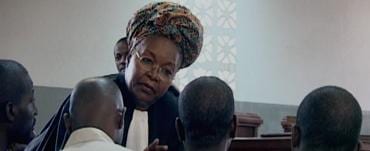In November, three men in Cameroon were sentenced to five-year prison terms simply because they are gay, which is illegal in the West African country.
The incident was only the most recent case in a country that frequently puts gays and lesbians behind bars.
Amnesty International has been working in Cameroon and other parts of the world to fight criminalization of homosexuality, as well as to raise awareness about the rights of gays and lesbians.
In Canada, the national Amnesty International chapter will highlight the issue on Dec 10, International Human Rights Day, and screen a 2009 documentary about gay rights in Cameroon.
“It’s to raise awareness for this issue and to support the whole field of human rights film programming,” says Matthew Beard, director of communications and marketing at Amnesty International Canada, which is partnering with the Dutch embassy and the Canadian Museum for Human Rights to host the event.
The evening will include a screening of Céline Metzger’s French-language documentary Cameroun: sortir du nkuta (Cameroon: Coming Out of the Nkuta), followed by a discussion with the Cameroonian human rights lawyer who is the subject of the film. The event will conclude with a letter-writing party for Amnesty International’s Write for Rights campaign.
Attendees will have the opportunity to put pen to paper and express their outrage about the 14 different cases of human rights abuse featured in this year’s campaign.
Canadians are especially encouraged to write letters in response to a specific case of criminalization in Cameroon: that of Jean-Claude Roger Mbede, a 31-year-old Cameroonian student serving time for “homosexuality and attempted homosexuality.” Mbede was arrested on March 2 and convicted on April 28.
“[Mbede] is currently serving a three-year jail sentence for sending a text message to a same-sex date,” says Beard, who says there is no discussion of his story in Coming Out of the Nkuta. “If you look at the Write for Rights section of the Amnesty Canada website, you’ll get the full low-down on the particulars of the case.”
Beard says Amnesty’s letters produced a positive outcome in half of last year’s Write for Rights featured cases.
“It proves that letter-writing, although it seems like an old-fashioned thing to do and that the governments we’re writing to would not be amenable to pressure, it really does work. The idea is that lots of small voices together make a lot of noise,” he says.
Such events are part of a growing worldwide initiative by Movies That Matter, an offshoot of Amnesty International located at the group’s Amsterdam office. The screenings are underwritten by contributions from human rights departments at Dutch embassies around the world.
“For a number of years, Amnesty International Netherlands was producing a very successful human rights film festival,” says Beard. “It became so successful, in fact, that a decision was made to create a separate company that would work exclusively on the organization of the film festival in Amsterdam. They have worked with embassies of the Netherlands around the world to screen movies all over the world.”
This year, Ottawa was chosen to be part of expanded programming for Movies That Matter, as well as the organization’s move to get films like Coming Out of the Nkuta to a wider audience.
The film chronicles the work of Cameroonian human rights lawyer Alice Nkom, who offers support, advocacy and legal representation to gays and lesbians facing criminal charges because they are gay.
Nkom will be interviewed at the Ottawa event by Alex Neve, secretary general of Amnesty International Canada, via live video link.
“There is an increasing issue [with criminalization of queers in African countries]. Nigeria is tabling yet more legislation that will criminalize homosexuality,” says Beard. “We find that the focus on a specific case can affect broader change. The issue goes beyond Cameroon, and it obviously goes way beyond a particular individual, but focusing on an individual is a way of drawing attention to the problem.”
The Deets:
Cameroun: sortir du nkuta (French with English subtitles)
Discussion with Alice Nkom and letter-writing party
Sat, Dec 10, 4pm onward
Mayfair Theatre
1074 Bank St
$5-10
amnestyinternational.ca
moviesthatmatter.org

 Why you can trust Xtra
Why you can trust Xtra


